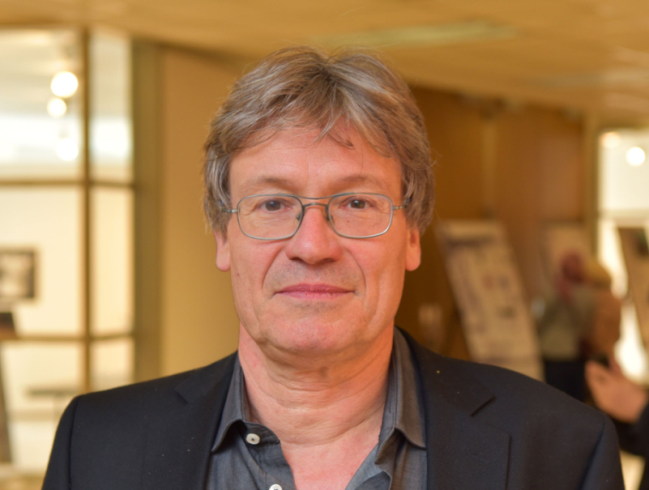
Christian Schmid from the Federal Institute of Technology Zurich (ETH Zurich)
Photo: Lafarge Holcim Foundation
Professor Christian Schmid, Emeritus of Sociology in the Department of Architecture at the Federal Institute of Technology in Zurich, is the next guest of the FUNDEP/IEAT Chairs program. A geographer and urban researcher, the professor will dedicate part of his time at the university to a schedule of academic activities open to the general public, organized by UFMG professors João Tonucci, from the Center for Regional Development and Planning (Cedeplar), and Thiago Canettieri, from the School of Architecture.
On October 7th, Christian Schmid will deliver the Grand Lecture “Vocabularies for an Urbanizing Planet: an Epistemological Reorientation,” beginning at 2:30 pm in Auditorium 1 of the UFMG School of Economic Sciences (Face). The lecture will be held in English and will feature Professor Heloisa Soares de Moura Costa, from the UFMG Institute of Geosciences (IGC), as a discussant. Registration is available through the Even3 platform. Certificates of participation will be issued.
In a synopsis submitted, Christian Schmid explains that the urban world has fundamentally changed in recent decades, with a wide range of urbanization processes resulting in complex and often surprising urban territories. According to him, these new structures have disrupted conventional understandings of urban space, which requires critical rethinking in dialogue with various fields of knowledge. One example of these changes is the innovative patterns of extensive urbanization that are crystallizing in agricultural areas, tropical forests, and oceans, sparking multiple social struggles and challenging inherited conceptions of the urban as a delimited zone and a type of dense settlement.
“This diversification of urban forms demands a differentiated perspective on the dynamics of urbanization. The challenge is not only to analyze the multitude of urban territories, but also the various urbanization processes that are transforming these territories and generating these forms. This means that spatial units of analysis—conventionally based on demographic, morphological, or administrative criteria—need to be reconsidered,” explains Christian Schmid.
At the conference, Christian Schmid intends to reflect on urbanization processes, which do not simply unfold within fixed or stable urban “containers,” but are actively producing, destabilizing, and revolving urban territories, and generating new urban configurations. For him, the essential task is to investigate the historically and geographically specific dynamics of urbanization processes. To this end, he advocates the need for a new vocabulary of urbanization that helps decipher these rapidly changing urban territories, in order to facilitate discussions and common understandings of urbanization.
Christian Schmid will present recent reflections on the epistemology of the urban, developed by him and Neil Brenner of the Graduate School of Design at Harvard University. Drawing on Henri Lefebvre’s theory of the production of space, they developed the concept of planetary urbanization as a tool for better understanding contemporary patterns and paths of urbanization. As Christian Schmid explains, this planetary perspective inevitably challenges familiar positions and understandings in urban studies, as it requires decentralizing the analytical perspective on urbanization and adopting an eccentric stance in conducting careful analyses on the ground. To conclude, he will present data from recent research that explored various urbanization processes and related struggles across the globe.
On October 23, from 2:30 pm to 5:00 pm, he will teach the Extended Urbanization and the Struggle Seminar, also in Auditorium 1 at Face. The event, organized by the UFMG Graduate Program in Economics (PPGE/Cedeplar), will feature Professor Roberto Monte-Mór (Cedeplar) as a panelist. The seminar, taught in English, is open to the general public and requires no registration.
About the Guest
Christian Schmid is a geographer and urban researcher. He is Professor Emeritus of Sociology in the Department of Architecture at the Swiss Federal Institute of Technology Zurich (ETH Zurich). His research focuses on planetary urbanization, comparative urban analysis, and theories of urbanization and space. He is a founding member of the International Network for Urban Research and Action (INURA). He wrote a comprehensive reconstruction of Henri Lefebvre’s theory of spatial production, published by Edital Verso in 2022. Together with architects Roger Diener, Jacques Herzog, Marcel Meili, and Pierre de Meuron, he co-authored the book “Switzerland: An Urban Portrait” (2006), a pioneering analysis of extensive urbanization. He is also co-editor of two recently published books on planetary urbanization: “Vocabularies for an Urbanizing Planet: Theory Building through Comparison” (with Monika Streule), on urbanization processes in eight large metropolitan areas; and “Extended Urbanization: Tracing Planetary Struggles” (with Milica Topalović), which presents case studies in different territories of extended urbanization across the globe. Both books are available open access from Birkhauser.